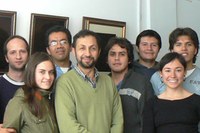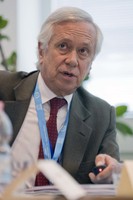 The name belies the purpose. The International Centre for Physics (Centro Internacional de Física or CIF) in Bogotá, Colombia, doesn’t just focus on the study of physics but also engages in a wide range of activities designed to put science to work to help grow Colombia’s economy, Eduardo Posada, CIF’s director, outlined the centre’s agenda at the COMSATS' Coordinating Council’s meeting held in Trieste, Italy, 12-13 May. TWAS hosted the event.
The name belies the purpose. The International Centre for Physics (Centro Internacional de Física or CIF) in Bogotá, Colombia, doesn’t just focus on the study of physics but also engages in a wide range of activities designed to put science to work to help grow Colombia’s economy, Eduardo Posada, CIF’s director, outlined the centre’s agenda at the COMSATS' Coordinating Council’s meeting held in Trieste, Italy, 12-13 May. TWAS hosted the event.
“Abdus Salam, the Nobel Prize winning physicists from Pakistan who led the efforts to create TWAS and the International Centre for Theoretical Physics (ICTP) in Trieste,” says Posada, “also proved instrumental in the creation of CIF. Our centre was launched in 1985, some 20 years after the establishment of ICTP and just 2 years after the founding of TWAS.”
“CIF,” Posada explains, “modelled itself after ICTP, offering training workshops and short courses for students interested in physics. Although not nearly as large or well-known, CIF became, in some sense, the ICTP of South America.” Over the past 25 years, the centre has organized some 200 training activities that have attracted more than 8,000 participants.
In 1990, the National University of Bogotá gave CIF a building. The centre’s leaders, who included Posada, decided not just to expand CIF’s training efforts but also to launch a research agenda that would encompass a variety of physics-related topics, ranging from biophysics to material science to optics. Equally important, CIF decided to focus a good deal of attention on applications of physics to real-world problems and to explore issues with a direct bearing on the country's economic and social well-being.
 “Idealism,” Posada notes, “certainly helped to shape the centre’s expanded agenda. CIF officials wanted to sponsor programmes that would not only train young students but also strengthen Colombia’s economy. "Yet idealism," he is quick to add, “was not the only factor. Practical considerations also came into play.”
“Idealism,” Posada notes, “certainly helped to shape the centre’s expanded agenda. CIF officials wanted to sponsor programmes that would not only train young students but also strengthen Colombia’s economy. "Yet idealism," he is quick to add, “was not the only factor. Practical considerations also came into play.”
CIF, like many research institutions in Colombia, is a private, non-profit organization that does not receive any direct operating funds from the government. Consequently, it must seek funding for specific programmatic activities and then set-aside a portion of its project-directed grant money – usually 15 to 20 percent − to pay salaries and overhead. More than 40 institutions in Colombia, many in agricultural-related fields, operate in the same way.
The funding structure, which in many ways is unique, especially for developing countries, doesn’t breed complacency. In fact, as Posada observes, “it encourages the centre’s scientists to be very entrepreneurial and to propose projects that appeal to potential sponsors, whether they are in government or the private sector.”
Today, CIF operates on an annual budget of about USD2 million dollars and has a professional staff comprised of 25 people. There are five research groups, each led by four or five senior researchers. Fifteen to twenty students, seeking either Masters’ or doctorate degrees usually in affiliation with the National University of Colombia, provide additional research expertise. CIF’s facilities are equipped not just with classrooms but also laboratories. The centre’s fields of study and problem-solving experimentation include biophysics, material science, neuroscience and optics.
CIF, for example, is currently engaged in studies of electro-physiological applications for the treatment of tropical parasitic diseases, including Leishmaniasis, a potentially deadly ailment that afflicts an estimated 12 millions people worldwide, virtually all of whom live in the developing world. “This research effort,” Posada says, “is designed to enhance our understanding of the physiological and biological mechanisms that drive not only Leishmaniasis but all tropical diseases. Ultimately, we hope to provide evidence-based findings that can lead to better medical interventions and treatments.”
Other CIF projects involve the development of sophisticated laser imaging techniques for environmental monitoring, studies of microorganisms for the creation of biofilters to address pollution problems related to the use of insecticides, and applications of nuclear techniques to uncover land mines that continue to pose a significant threat in conflict-ridden areas, including those places in Colombia that have been plagued by drug-related violence.
CIF has also gained increasing recognition for its technical prowess in developing electronic instrumentation for industrial use. To date, these efforts have led to the development of 20 specific product lines and three spinoff companies.
“Our success in developing state-of-the-art instrumentation," Posada says, “has helped us gain additional confidence from potential funders both in government and the private sector.” Sponsors are increasingly viewing the centre’s research as part of a larger strategy to develop technologies that can generate both profits for private companies and greater wealth for the nation as a whole. For CIF, of course, this means more opportunities to acquire grant money that will allow it to further develop and expand its research agenda.
“Abdus Salam was a world-class theoretical physicist who is one of only a handful of scientists from the developing world to have been awarded the Nobel Prize. But, as his renowned efforts to create ICTP, TWAS and CIF show, he was not only dedicated to build scientific research capacity in the South but also to utilizing science to building more prosperous and secure societies. Both science and science-based development are part of his inspiring legacy and we hope to make that a part of CIF’s legacy as well. For all of these reasons and more, Posada says, “I think that if Salam were alive today, he would be more than pleased by the course of action that CIF has taken, and would undoubtedly offer uncompromising support for the centre’s ongoing efforts to link science to social well-being.”
For additional information about CIF, see www.cif.org.co.

